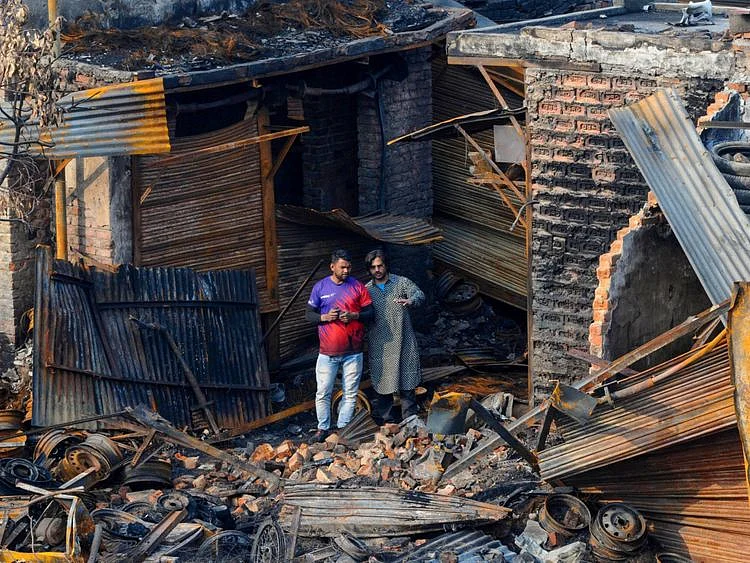India: Why the RSS hates Nehru?
For BJP’s parent organisation, Indian identity is essentially clothed in a religious garb

Purushottam Agarwal’s Who is Bharat Mata? explores the intense and angry debate on the architect of modern India: Jawaharlal Nehru. And in his book he cleverly juxtaposes the proposition that if one were to roll back time, it would appear from the slandering that goes on, ad-infinitum, of the country’s first prime minister, that the principle opposition leader to the BJP and to Prime Minister Modi was and has been Nehru than Sonia Gandhi or Rahul Gandhi.
Nehru is Rashtriya Swayamsevak Sangh’s (RSS) bête noire and this acrimony is long standing. There is nothing he has done right as per the RSS.
Undoubtedly Nehru was fallible but this attempt to hold him responsible for all the nation’s ills speaks of a deep-seated fear: And fear begets hate. It’s almost as though if Nehru is right then not only are they wrong but their entire world view would collapse.
Take the oft repeated victory incantations of the RSS, ‘Bharat Mata Ki Jai’ (Glory to Mother India) and see how Nehru threads it. At a public gathering way back in 1936, he asks, “Who is Bharat Mata, whose victory you wish?” He explains: “The mountains and rivers …. were of course dear to everyone, but what counted ultimately were ‘the people of India’ … spread out all over this vast land. Bharat Mata, Mother India, [is] essentially these millions of people.”
This description is antithetical to the RSS way of thinking. The Indian identity, for them is defined in exclusionary terms instead of anchoring it in territory and land (as the founding fathers envisioned it).
For the RSS, the Indian identity is clothed in a religious garb with a deliberate attempt at ‘othering’: negating Nehru’s idea of India, and compels us to question the world view of the RSS? How does the RSS want India to see the world and how does it want the world to see India?
This demands a separate analysis but suffice it to say that unwittingly they have gone about creating a Hindu Pakistan, the very state that they hate: an irony of many parts. Israel and China are their lodestars, and this speaks of their shallow thinking.
Aggressive assertion of Hindu identity
The political rise of the RSS has been long in the making and the inexorable surge of Hindu nationalism was perhaps inevitable. The demolition of the Babri Masjid mosque in 1992 is sighted as a watershed moment in the nation’s life, the first sign of this churn to the Hindu right and the beginnings of the aggressive assertions of the Hindu identity.
Many saw that act of vandalism as an aberration and assumed naively that the secular foundations of the country would be robust enough to withstand these pernicious and deeply divisive avowals by a fringe. After all in electoral politics these voices had no saliency, the BJP won just two seats in 1984.
But, read what Ambedkar, the great constitutionalist, had to say, “Constitutional morality is not a natural sentiment …. our people have yet to learn it. Democracy in India is only a top-dressing on an Indian soil which is essentially undemocratic.”
Indeed not just democracy but pluralism and tolerance was and is, just the top dressing. Deep down, in the underbelly, there is a cauldron brewing that snake oil of Hindu xenophobia and ancient prejudices, exposing the fragility of the original secular model that the founding fathers imagined for the country. The top down model was effete, the intellectual class and the front line leaders of the freedom movement espoused these principles but the masses were unconvinced. In the first flush of freedom these lofty thoughts were tolerated and mouthed by the middle class as well but over time they have given in to their inbred atavistic impulses and the results are there to see in Modi’s India.
The death toll from Delhi’s worst riots in decades over the disputed new citizenship law is a grim reminder of the earlier happenings: Gujarat in 2002 and Delhi in 1984. Kapil Mishra, the BJP leader’s chant ‘Shoot the traitors’, is reminiscent of the partition days; the very ecosystem that caused the assassination of the Mahatma. All this under the watch of the ‘iron man‘ of India: Modi.
The RSS today tries to redact the statements made by its founders, K.B. Hedgewar and Guru Gowalkar but the mindset has never changed. Golwalkar’s ‘Bunch of thoughts’ is explicit enough on Muslims. Modi’s Sabka Saath, Sabka Vikas: Collective Efforts, Inclusive Growth, was a smoke screen to mask the real agenda. The prime minister schooled in the exclusionary philosophy of his alma mater, the RSS, has shown his hand. And far from being considered as one of India’s most consequential prime ministers, he has turned out to be one of its most dangerous leaders since independence. No wonder Nehru is feared and hated.
— Ravi Menon is a Dubai-based writer, working on a series of essays on India and on a public service initiative called India Talks.
Sign up for the Daily Briefing
Get the latest news and updates straight to your inbox
Network Links
GN StoreDownload our app
© Al Nisr Publishing LLC 2026. All rights reserved.